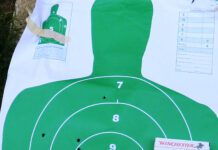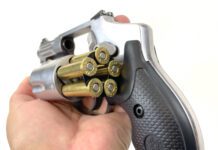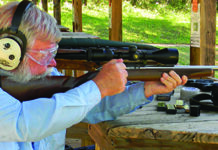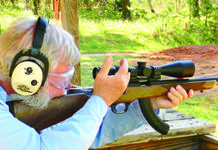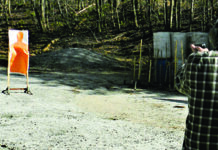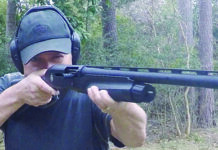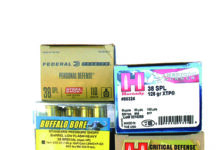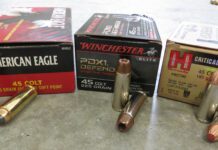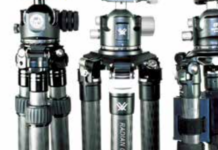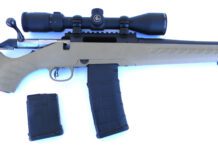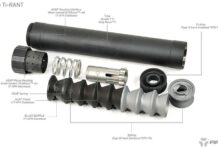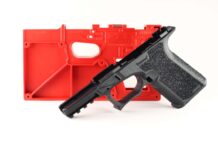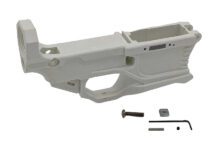You may not have heard of this company, UTAS (pronounced YOO-tash), a Turkish firm that specializes in firearms design, engineering and OEM manufacturing. UTAS has had its designs voted Gun of the Year by the NRAs American Rifleman magazine in 2006 and in 2007. One product from UTAS is the UTS-15 tactical shotgun, a 12-gauge pump-action shotgun with two 7-round alternately feeding or selectable magazine tubes.
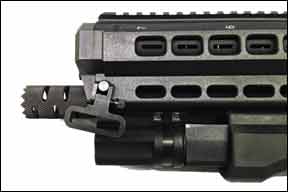
We recently tested a UTS-15 as a follow-up to our November 2012 test of high-capacity shotguns, the Akdal Arms MKA 1919 3-inch 12 Gauge, $799; the Kel-Tec KSG 3-inch 12 Gauge, $1075; the Saiga IZ-107 12 Gauge, $640; and a Red Jacket Saiga RTS-SBS-12 Short-Barrel 12 Gauge, $1939. Of that quartet, we preferred the Saiga and the KSG.
While we were standing in the shop at Tactical Firearms in Katy, Texas (TacticalFirearms.us) waiting to pick up our UTS-15 for testing, the range staff was going on and on about how the gun looked like a weapon from a sci-fi movie. They werent kidding; if you have seen the movie Starship Troopers, this gun resembles the Morita battlerifle that the Mobile Infantry used to kill Bugs. But according to UTAS, the shotgun doesnt hail from outer space. The UTS-15 is just a bullpup pumpgun created from the ground up using fiber-reinforced polymers for 85 percent of the parts. In particular, the receiver is completely molded from polymer.
Numerous gun celebrities on the internet have reviewed this shotgun and had no luck with it. FPSRussia went through three UTS guns while shooting his video because he actually broke three different parts. Would our unit be plagued with the same problems as some of the other early-model bullpup shotguns reviewed back in November? Or would it be Gun Tests approved right out of the box? Heres what happened:
Versions
If you are not a fan of the Space Age solid black look of this UTS-15, it is available in three other finishes based on their projected use: Desert, which has a digitized desert-sand camouflage pattern; Marine, which has a blue base coat over which the black-and-gray non-glare digital camouflage pattern is applied; and Hunting, a woodland camouflage pattern.
The Marine version is constructed to withstand the difficult conditions of the sea. The springs used in the Marine version of the UTS have a special corrosion-resistant coating, and all of the exposed metal parts have satin-nickel plating to make them impervious to saltwater. Other metal parts, such as the barrel, are black chromed for minimum maintenance.
The Hunting UTS-15 is equipped with the optional windage adjustable flip up ghost ring, or big game V rear sight and elevation adjustable front sight. If you prefer predator hunting, the UTS has an optional pushbutton- operated high-intensity spotlight and laser light that installs inside the gun underneath the barrel.
Features
One of the first things we noticed was the compartment in the buttstock, which houses the action. A release lever allows the shooter to lift up the rear compartment and clear any jams or misfeeds. The shooter can then close the compartment, rack the gun, and get back in the fight.
Moving forward on the gun, the loading ports appear on the left and right sides. The ports have gates that are manually opened to load rounds into the magazine, and then shut when the last round has been loaded. The ejection port is located behind and below the right-side loading gate.
Along the top of the gun is the magazine tube selector. Its a rocker switch that allows the shooter to choose which tube to fire from. We liked this feature, for it allows the shooter to switch between cartridges, e.g, between slugs and buckshot, when boar hunting, or non-lethal and lethal rounds for law enforcement. Even when manhandling the switch, we were not able to break the switch as some testers have reported.
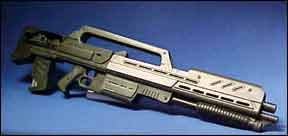
Continuing along the top of the gun, a long Picatinny rail allows the user to add optics or accessories. On either side there are loaded-round markers that display how many rounds are in the magazine. They are indicated with big white numbers along the black frame. The shooter can also see into the magazine tube, so with a glance he can tell how many shots are left. Along the right-hand side of the gun right above the trigger guard are the controls for the optional light. Our test gun did not come with the light, so we were unable to test its functionality. Along the left side of the gun above the trigger is the AR-15-style safety, a large lever design we found was easy to move from Safe to Fire and back.
The forearm, made from the same polymer as the rest of the gun, had an unusual texture, our testers said. The grip is bevelled, with vertical grooves on the front and rear end of the forearm. But there was no texturing in the middle of the forearm. Our testers found it odd that there was no Picatinny rail strips on the bottom for vertical foregrips or other front-end accessories.
Disassembly
Field stripping can be done in eight steps and does not require any special tools to take apart. First, remove the barrel retaining cap located under the barrel on the front of the gun. Next, lift the stock. After that, slide the barrel and magazine assembly off. Once those are removed, slide the fore-end and bolt assembly out. At this point, clean the gun and all of the internal mechanisms. To take the UTS completely apart, continue and open the stock to the full up position and knock out the three receiver retaining pins and the single upper buttplate pin. With the buttplate pin removed, remove the buttplate and stock. Next, remove the receiver and gearbox assembly by rotating it vertically to unhook the trigger linkage from the trigger itself. The last step is to remove the gear box retaining pin (one-quarter inch) from the left side and pull the gear box out of the receiver.
On The Range
Our testers were eager to get the gun on the range and start shooting. We tested with a variety of ammo: Remington 12 gauge 00 buckshot, Fiocchi 12 gauge buckshot, and Fiocchi 12 Gauge Crusher. When we first started shooting, our testers had trouble adapting to the strange location of the magazine tube. Loading the shells in the left tube with the non-trigger hand was easy. The problem was trying to decide which hand to use to load the right side tube. If a righty uses his left hand, has to reach and over extend to the far side of the gun to load a round in the magazine tube. Tactical practitioners will not want to take their hands off the trigger to load the rounds in the right magazine tube.
When loading a round, take notice to put the shell all the way in and then push the shell forward into the magazine tube. This is unlike on a pump shotgun like the Remington 870, where the shooter can use a single fluid motion to load a round into the magazine.
Our testers put 500 rounds through the gun with only two malfunctions. The first arose when trying to load a round from the magazine tube. The issue appeared to be caused by short-stroking the forearm. The round was not able to fully eject from the magazine tube to enter the action, and when pulling the forend forward, the round got stuck. The second malfunction was a failure to eject, causing the action to jam.
Our Team Said: The UTS-15 worked like a well-oiled machine. We liked the feel and the way the gun moved. Capacity was top shelf – load on Sunday, shoot well into next week. But we still have reservations. If we were choosing between a Saiga at half the cost and the UTS, just the dollars would give the Russian a win. Also, this is a fairly new design, and our recent experience with the prototype KSG and a 2nd-Gen SIG Sauer 556R, or any other new design on the market, would make us pause. If you have already purchased a UTS-15, it appears that UTAS is performing warranty work on guns that are having problems under the one-year warranty. So, our recommendation is to wait this one out and let the non-Gun Tests readers be the beta testers on the UTS-15.
Written and photographed by John Taylor, using evaluations from Gun Tests team testers.


